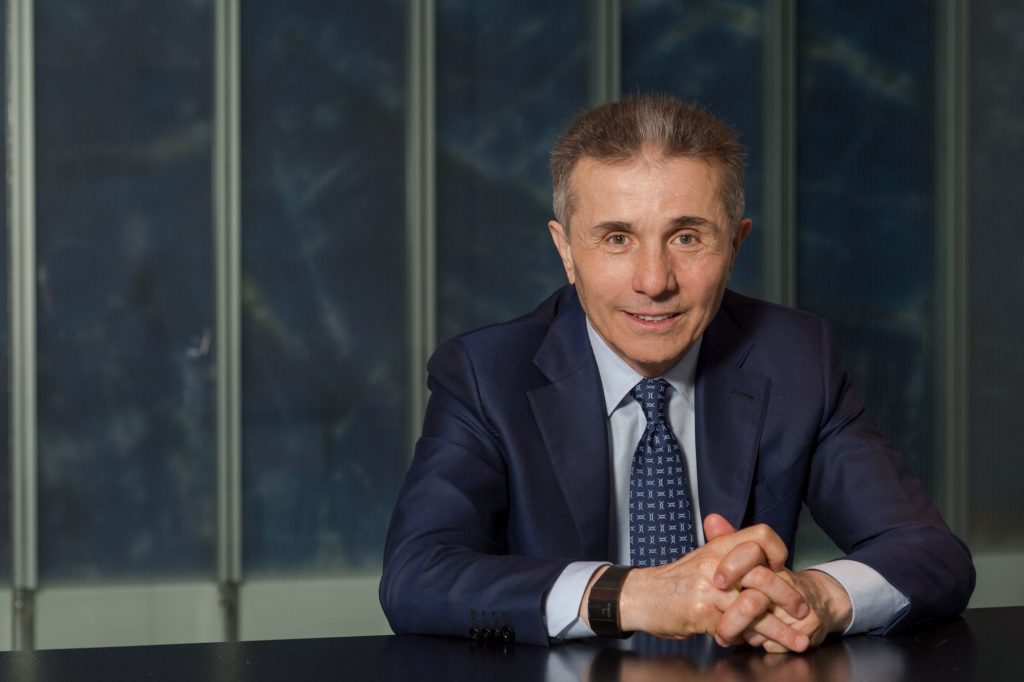How does oligarch Bidzina Ivanishvili de facto rule Georgia?
Ivanishvili’s informal rule in Georgia
The fact that the oligarch and billionaire Bidzina Ivanishvili is the informal ruler of Georgia is often talked about by local and international non-governmental organizations, politicians and experts.
JAMnews assessed several signs of his informal rule based on an investigation by Transparency International Georgia and discussed them with the program director of the Center for Social Justice of Georgia, lawyer Guro Imnadze.

Bidzina Ivanishvili is the founder of the ruling Georgian Dream party. He served as prime minister in 2012–2013. After that, he publicly announced his retirement from politics. But then he formally “returned” to the party in 2018. About three years later, he again issued a letter declaring his “final retirement” from politics. In fact, he never retired, which is confirmed by many incidents of the political life of Georgia.
Important personnel decisions are made only in agreement with Ivanishvili
No serious political decision in Georgia can be made without the consent of the informal ruler Bidzina Ivanishvili. Constitutional institutions – parliament and ministries – are ignored when making decisions.
This is especially evident in the coming and going of prime ministers.
Examples:
● Irakli Garibashvili (the current Prime Minister) has been in this position before and abruptly resigned on December 23, 2015. Ivanishvili confirmed that Garibashvili consulted with him before resigning.
● Another former prime minister, Giorgi Kvirikashvili, also resigned quite abruptly on June 13, 2018. He explained his decision by “disagreements with Ivanishvili on fundamental issues.” And Ivanishvili, by this time, did not hold any government posts and was an ordinary citizen.
● The departure of the next prime minister, Mamuka Bakhtadze, on 2 September 2019 was also unexpected. He announced his resignation in an unusual way – he published a huge post on his Facebook page. “A strategic development model has been created in Georgia, it has been implemented, and I […] consider my mission accomplished at this stage”, Bakhtadze wrote. Ivanishvili later thanked him for his “civilised departure”.
● Giorgi Gakharia was the only prime minister who resigned in protest on February 18, 2021, citing disagreements with the Ivanishvili team as the reason. He also said that he tried to communicate with the informal ruler of Georgia before his resignation, but to no avail. At this time, Ivanishvili did not hold any government posts.
The fact that Ivanishvili personally appoints and dismisses high-ranking officials can be confirmed by the interviews with the officials themselves.
Former or current members of the government often said directly that personnel decisions would be made directly with the participation of Ivanishvili.
For example, former Economy Minister Giorgi Kobulia, who took over in 2018 when Ivanishvili was no longer prime minister, says he agreed with him on some of his views. According to him, he met with Ivanishvili before he was fired.
Irakli Garibashvili said that Giorgi Gakharia was first appointed Business Ombudsman, then Economy Minister, Interior Minister, and then Prime Minister “with Bidzina Ivanishvili’s power of attorney”.
Interference in the decisions of officials was repeatedly confirmed by Bidzina Ivanishvili himself. He said that “there are cases when he is consulted”.
Ivanishvili said: “Of course, I took part in this, but not that I recruited anyone into the army and the police. Maybe I gave advice that might not be have taken into account.
“I repeated to the team several times: do not expect any comments from me, in this regard you will be absolutely free”.
The government denies the fact of informal governance, but constantly emphasizes the special role of former Prime Minister Bidzina Ivanishvili and does not hide the fact that the founder of the party is often asked for his opinion, including when making important personnel decisions.
Guro Imnadze: Under the conditions of informal government, the question of political responsibility is practically not raised. We know who is responsible for the specific actions of the management team, but we cannot demand their resignation. Even the existing formal leaders are not real decision makers. For example, if we demand the resignation of the prime minister, we know that this may have zero effect – the old prime minister will be replaced by a new one.
People personally associated with Ivanishvili are appointed to key positions
The experience of recent years shows that high-ranking politicians in Georgia do not have clear political or party experience, but are appointed only by the degree of their closeness with Bidzina Ivanishvili.
Examples:
● The country’s current prime minister, Irakli Garibashvili, has been with Ivanishvili’s Cartu since 2004. In an interview, Ivanishvili said that Garibashvili helped him in relations with business partners, for example, he once bought a helicopter.
In an exclusive video obtained by Formula TV showing Ivanishvili testifying during a dispute with a Swiss bank in a Bermudian court, he quotes the country’s prime minister as his personal secretary, sending his letters, meeting with business delegations, making money transfers and etc.
According to Ivanishvili, Garibashvili was not an authority for him. He also says that Garibashvili has neither legal nor financial education
● Another Prime Minister of Georgia (2015-2018), Giorgi Kvirikashvili, also held senior positions at Ivanishvili’s Cartu Bank.
● The current Interior Minister, Vakhtang Gomelauri, used to be Ivanishvili’s head of bodyguards.
● Former Prosecutor General Shalva Tadumadze was Ivanishvili’s personal lawyer.
● The head of the State Security Service, Grigol Liluashvili, has previously held senior positions in a number of companies owned by Bidzina Ivanishvili – Cartu-Bank, LLC Burji and others.
● Former infrastructure ministers Maia Tskitishvili and Nodar Javakhishvili also held senior positions in Cartu.
● Former Minister of Economy and Finance and former Deputy Prime Minister Dmitry Kumsishvili was Bidzina Ivanishvili’s director of Cartu Bank JSC.
● Anzor Chubinidze, head of the Special State Security Service, formerly worked as head of Bidzina Ivanishvili’s bodyguard.
In return, Ivanishvili regularly receives public thanks and praise from members of the government or representatives of the ruling party.
Guro Imnadze: “When people are appointed to important positions not on the basis of political or professional experience, but on the basis of connections with an oligarch, this indicates informal management, and also that decisions in the country are made not by open procedures and predictable criteria, but by depending on personal interests.
Large-scale projects
Experts believe that one of the most visible manifestations of informal governance is the large-scale projects that Ivanishvili is implementing throughout Georgia.
First of all, of course, this is the construction of a dendrological park on the Black Sea coast in Guria, during which centuries-old giant trees were uprooted from different parts of the Black Sea and transported to the small town of Shekvetili, where Ivanishvili’s residence is located. Many articles have been written about the construction process of this park in international media and a documentary was made about it.
Numerous facts, studies, journalistic investigations, eyewitness accounts testify to the scale of Ivanishvili’s work to create this park and how the entire state machine was involved in the implementation of the project.
The metropolitan project “Panorama of Tbilisi” is of a similar scale. The hotel complex is being built on Freedom Square, Mount Tabori and the Sololaki Ridge. Some of the facilities will be interconnected by a cable car. According to Ivanishvili, these hotels are designed for “high-ranking and wealthy” guests. The project has been criticized by most of the civil society, saying that it poses a threat to cultural heritage.
In addition, Bidzina Ivanishvili launched a large-scale construction in Abastumani, where he acquired the former building of the TB dispensary and the land around it, with a total area of up to 24,000 square meters.
Transparency International Georgia: These personal projects of Ivanishvili are a good illustration of how any procedure, regulation or law at any level of the state is completely ignored and adjusted to the personal interests and wishes of Bidzina Ivanishvili, who is in charge of informal governance.
Guro Imnadze: “If an ordinary businessman wants to implement such a project, such support from various government agencies, especially the City Council or the Ministry of Economy, should not be expected”.
Powerless parliament in a parliamentary republic
Experts note that the parliament has completely lost the function of control over the executive branch, and the main reason for this is informal management. Deputies of the ruling party, as well as members of the executive branch, are under the influence of Ivanishvili.
A vivid example of this was the “trick” that Ivanishvili pulled in parliament regarding the proportional electoral system:
As a result of popular protest, Ivanishvili promised that the 2020 parliamentary elections would be fully proportional, but when it came down to it and the parliament had to vote in favor of the bill, several members of the ruling party voted against it, leading to the failure of the law.
Guro Imnadze: “We saw the so-called rebel deputies, most of whom did not have a stand in parliament before the legislative initiative. They seemed to suddenly decide that they should be against the bills initiated by the ruling team itself. The purpose of this “uprising” was the fulfillment of an informal order.
“Thank you, Mr. Bidzina” – Ivanishvili’s cult of the ruling party
Members of Ivanishvili’s team called him “Wise man”, “Grandmaster”, “Pele”, “Unique person”, and also said that “the process of his entering and leaving politics was an act of political charity”.
Other examples:
Irakli Garibashvili, Prime Minister: “Bidzina Ivanishvili is the greatest philanthropist who always thinks about Georgians”.
Lado Kakhadze, MP: “With his life he deserved more than an award”.
David Matikashvili, MP: “Bidzina Ivanishvili’s charity is already known all over the world”.
Lasha Natsvlishvili, former Deputy Prosecutor General: “Bidzina Ivanishvili is the parent of this government, whether we like it or not. Bidzina Ivanishvili is in the ranks of this government”.
Tea Tsulukiani, Minister of Culture: “It is very important that in a small country there is such a person who not only the people, but also state institutions can rely on. Every citizen expresses special gratitude to him and his family”.
Eliso Bolkvadze, deputy: “Bidzina Ivanishvili should be awarded much more than the Order of Honor. In my opinion, he should be given all the orders that exist in this country.
Tornike Rizhvadze, head of the government of Adjara: “Bidzina is one of the most outstanding, courageous and patriotic Georgians I have ever met.”
Guro Imnadze: “Given the context and the decisions that officials make on a daily basis, this rhetoric confirms their informal subordination to Bidzina Ivanishvili. The informal influence on this rhetoric is especially noticeable during crises. For example, before the elections, special attention is paid to Ivanishvili. The ruling team is trying to justify its legitimacy by supporting Ivanishvili. Based on this rhetoric, the source of their legitimacy is not the people, but Bidzina Ivanishvili”.
“The executive power is completely under the influence of one person”
Transparency International reports that Ivanishvili’s informal rule in Georgia is evident in many other areas, including the judiciary. The organization concludes that “today, the executive power of the government of Georgia is completely under the influence of one person”.
“The executive branch has dismantled the democratic mechanisms of restraint and balance due to weak parliamentary oversight and an informal deal between the ruling party and an influential group of judges who fully control the judiciary.
Bidzina Ivanishvili, who has not held any official public office for years and is not accountable to society, has successfully managed to put key state institutions of Georgia, including formally independent bodies, at the service of his business interests and personal security”, the report says.






















